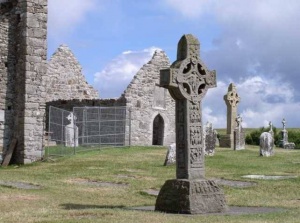Sant Kerne
Un article de GrandTerrier.
1 Fiche signalétique
|
2 Almanach
| |||||||||||||||||||||
3 Sources |
4 Iconographie | |||||||||||||||||||||
5 Monographies
Site en.wikipedia / Saighir :
Ciarán
Ciarán, Kieran, Kyran, Keiran, Kieren, or Kieron, (pronunciation: /kɪˈɛra:n/ or Kee-uh-rawn, with the 'uh' barely spoken; the name is Anglicised as Kieran, pronounced Kee-ran where the long 'a' of the Irish is shortened), is a Gaelic personal name meaning 'Little Dark One', 'Dark Prince' or 'Dark Haired One'. Ciarán comes from the Gaelic word 'Ciar' which means 'dark' or 'black'. Ciar can be linked back to Ciar, son of Fergus, King of Ulster. It is linked with many names, like Kerry meaning Ciar's People. It is generally associated with a number of Irish saints: The earliest Christian monument in Ireland is the Kilnasaggart standing stone in County Armagh. It carries an inscription which tells how it was put in place by Ternoc Kieran. He died in 710 a.d. but the family name of Kieran remains common in that area.
- Saint Ciarán Saighir (the Elder) was an early Irish bishop, the founder of Seir-Kieran, County Offaly, and also of the Bishopric of Ossory. Clear Island is regarded as his birthplace. The saint is sometimes referred to as one of four bishops to have preceded Saint Patrick in Ireland. This is unlikely, though he may have been his contemporary. His feast day is 6 March.
- Saint Ciarán of Clonmacnoise from Connaught was the founder of Clonmacnoise Abbey in the early 6th century. He died on 9 September around 546 at the age of 32. He is buried in the remains of his little church
- Saint Ciarán of Disert-Kieran, County Meath, called by the Irish annalists 'Kieran the Devout', wrote a 'Life of St. Patrick'. He died in 775 on 14 June, on which day his feast is celebrated.
- Saint Ciarán of Clonsost, is commemorated on 30 April
- Saint Ciarán mac Colga on 19 May.
Site en.wikipedia / Clonmacnoise :
Ciarán of Clonmacnoise
Born 516, Connacht, County Roscommon
Died 546
Feast September 5
Saint Ciarán of Clonmacnoise was an early Irish bishop. He is sometimes called Ciarán the Younger to distinguish him from Saint Ciarán Saighir.
Born in 516 in Connacht, County Roscommon, Ciarán was the son of a chariotmaker. He was a student of Finian's at Clonard and in time became a teacher, himself. He also studied under Saint Enda of Aran, who advised him to build a church and monastery in the middle of Ireland and in 545 he founded the Monastery of Clonmacnoise; he died about one year later of the yellow plague in his early thirties. His feast day is September 9.
Ciarán of Clonmacnoise was the tutor of Saint Carthage the Elder and legend has it that it was his cow which supplied the parchment for the Leobr na h'Uidre, Book of the Dun Cow, one of the oldest and most important Irish literary collections, compiled by a Clonmacnoise scribe in 1106.
The name Ciarán is arguably the same as Piran and, since Ciarán of Clonmacnoise's father is said to have been Cornish, it is possible that he should be identified with Saint Piran, the patron saint of Cornwall.[citation needed]
Site Answers.com / Kern :
Kern
1. Irish: reduced form of McCarron.
2. German, Dutch, and Jewish (Ashkenazic): from Middle High German kerne ‘kernel’, ‘seed’, ‘pip’; Middle Dutch kern(e), keerne; German Kern or Yiddish kern ‘grain’, hence a metonymic occupational name for a farmer, or a nickname for a small person. As a Jewish surname, it is mainly ornamental.
3. English: probably a metonymic occupational name for a maker or user of hand mills, from Old English cweorn ‘hand mill’, or a habitational name for someone from Kern in the Isle of Wight, named from this word.
Site Answers.com / McCarron :
McCarron
Irish: 1. Anglicized form of Gaelic Mac Cearáin, a form of Mac Ciaráin ‘son of Ciarán’, a personal name meaning ‘little dark one’, often Anglicized as Kieran. 2. Anglicized form of Gaelic Mac Carrghamhna ‘son of Corrghamhain’, a personal name composed of the elements corr ‘sharp’ + gamhain ‘calf’ (young bull).
